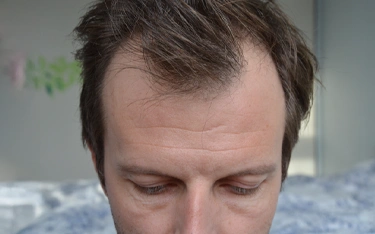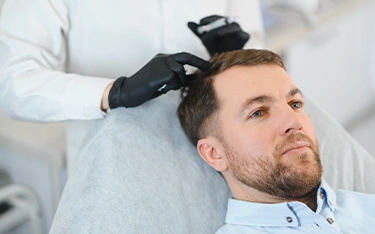Telogen effluvium is one of the most common causes of sudden hair shedding, affecting nearly 35%* of UAE residents, seeking hair loss treatment. It occurs when a large number of hair follicles enter the resting (telogen) phase simultaneously, disrupting normal growth and leading to visible thinning.
In the UAE, factors such as intense heat, water quality, post-viral recovery, and lifestyle stress make residents particularly vulnerable. About 3 in every 8 women* in urban UAE experience temporary or chronic shedding. Telogen effluvium also affects men, with nearly 1 in 5 male hair loss cases* linked to it, often mistaken for pattern baldness.
What Causes Telogen Effluvium?
Stress and Trauma
Telogen Effluvium can be acute (short-term) or chronic (long-term) depending on the duration and triggers.
- Acute Telogen Effluvium typically lasts less than 6 months and is often triggered by a specific stressor.
- Chronic Telogen Effluvium persists for more than 6 months and may not have an obvious trigger, often presenting as diffuse thinning across the scalp.
Common Causes of Telogen Effluvium:
| Acute Telogen Effluvium |
Chronic Telogen Effluvium |
| High fever or illness |
Chronic stress |
| Surgery or physical trauma |
Nutritional deficiencies |
| Postpartum hair loss |
Thyroid disorders |
| Sudden weight loss |
Iron deficiency |
| Severe emotional stress |
Long-term medication use |
| Certain medications |
Hormonal imbalances |
Stress-related hair loss is especially common among UAE working professionals, with 72%* of our Dubai patients citing workplace pressure as a contributing factor.
Dietary Factors
Crash diets, low-protein intake, and vitamin D deficiency are common triggers. The UAE University Nutrition Study (2023) revealed that nearly 68%* Emirati women are vitamin D deficient despite the sunny climate, primarily due to limited outdoor exposure and dietary habits.
Hormonal Changes
Pregnancy, childbirth, menopause, thyroid dysfunction, and hormone therapy can disrupt the hair cycle. Postpartum hair loss affects approximately 50%* of new mothers in the UAE, often starting 2-3 months after delivery.
Medications and Health Conditions
Drugs like antidepressants, beta-blockers, or those used in post-COVID recovery have been linked to telogen effluvium. Since 2020, our clinics have treated over 1,200 cases of post-COVID hair loss across the UAE, with an 87%* recovery rate.
Environmental Triggers
Surgical procedures, intense physical transformation, or exposure to the UAE's hard, desalinated water may result in temporary hair loss. Installing a shower filter and using weekly clarifying rinses can significantly reduce mineral buildup on the scalp.





